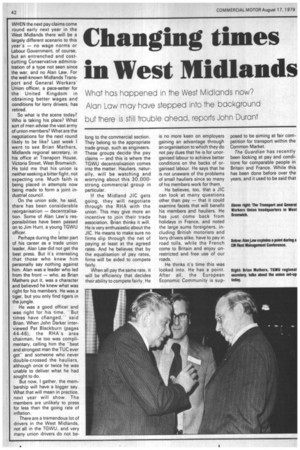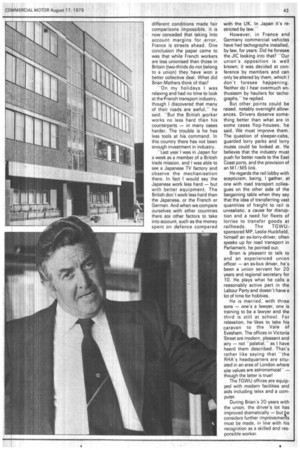Changing times in West Midlands
Page 44

Page 45

If you've noticed an error in this article please click here to report it so we can fix it.
What has happened in the West Midlands now? Alan Law may have stepped into the background but there is still trouble ahead, reports John Durant
WHEN the next pay claims come round early next year in the West Midlands there will be a largely different scenario to this year's — no wage norms or Labour Government, of course, but an entrenched and costcutting Conservative adminis tration of a type not seen since the war, and no Alan Law. For the well-known Midlands Trans port and General Workers' Union officer, a pace-setter for the United Kingdom in obtaining better wages and conditions for lorry drivers, has retired .
So what is the scene today? Who is taking his place? What sort of men advise the vast army of union members? What are the negotiations for the next round likely to be like? Last week I went to see Brian Mathers, Midlands regional secretary, in his office at Transport House, Victoria Street, West Bromwich.
He told me that his union is neither seeking a bitter fight, not expecting one. Much faith is being placed in attempts now being made to form a joint industrial council.
On the union side, he said, there has been considerable reorganisation — decentralisation. Some of Alan Law's responsibilities have been passed on to Jim Hunt, a young TGWU officer.
Perhaps during the latter part of his career as a trade union leader, Alan Law did not get the best press. But it's interesting that those who knew him personally say nothing against him. Alan was a leader who led from the front — who, as Brian Mathers put it, was a character and believed he knew what was right for his members. He was a tiger, but you only find tigers in the jungle.
He was a good officer and was right f or his time. -But
times have changed,' said Brian. When John Darker interviewed Pat Blackburn (pages 44-46), the RHA's area chairman, he too was complimentary, calling him the "best and strongest man the TUC ever got" and someone who never double-crossed the hauliers, although once or twice he was unable to deliver what he had sought to do.
But now, I gather, the membership will have a bigger say.
What that will mean in practice, next year will show. The members are unlikely to press for less than the going rate of inflation.
There are a tremendous lot of drivers in the West Midlands, not all in the TGWU, and very many union drivers do not be long to the commercial section. They belong to the appropriate trade group, such as engineers. These groups decide the pay claims — and this is where the TGWU decentralisation comes into the matter. Hauliers, naturally, will be watching and worrying about this 30.000strong commercial group in particular.
If the Midland JIC gets going, they will negotiate through the RHA with the union. This may give more an incentive to join their trade association. Brian thinks it will. He is very enthusiastic about the JIC. He means to make sure no firms slip through the net of paying at least at the agreed rates. And he believes that by the equalisation of pay rates, firms will be aided to compete fairly.
When all pay the same rate, it will be efficiency that decides their ability to compete fairly. He is no more keen on employers gaining an advantage through an organisation to which they do not pay dues that he is for unorganised labour to achieve better conditions on the backs of organised labour. He says that he is not unaware of the problems of small hauliers since so many of his members work for them.
He believes, too, that a JIC can look at many questions other than pay — that it could examine facets that will benefit his members and hauliers. He has just come back from holidays in France, and noted the large sums foreigners, including British motorists and lorry drivers alike, have to pay in road tolls, while the French come to Britain and enjoy unrestricted and free use of our roads.
He thinks it's time this was looked into. He has a point. After all, the European Economic Community is sup posed to be aiming at fair competition for transport within the Common Market.
The Guardian has recently been looking at pay and conditions for comparable people in Britain and France. While this has been done before over the years, and it used to be said that different conditions made fair comparisons impossible, it is now conceded that taking into account margins for error, France is streets ahead. One conclusion the paper came to was that while French workers are less unionised than those in Britain (two-thirds do not belong to a union) they have won a better collective deal. What did Brian Mathers think of that?
-On my holidays I was relaxing and had no time to look at the french transport industry, though I discovered that many of their roads are awful," he said. "But the British worker works no less hard than his counterparts — in many cases harder. The trouble is he has less tools at his command. In this country there has not been enough investment in industry.
-Last year l was in Japan for a week as a member of a British trade mission, and I was able to see a Japanese TV factory and observe the mechanisation there. In fact I would say the Japanese work less hard — but with better equipment. The British don't work less hard than the Japanese, or the French or German. And when we compare ourselves with other countries there are other factors to take into account, such as the money spent on defence compared with the UK. In Japan it's restricted by law.
However, in France and Germany commercial vehicles have had tachographs installed, by law, for years. Did he foresee the JIC looking into that? -Our union's opposition is well known; it was decided at conference by members and can only be altered by them, which I don't foresee happening. Neither do I hear overmuch enthusiasm by hauliers for tachographs," he replied.
But other points could be raised, notably overnight allowances. Drivers deserve something better than what are in some cases flop-houses, he said. We must improve them. The question of sleeper-cabs, guarded lorry parks and lorry routes could be looked at. He believes that the industry must push for better roads to the East Coast ports, and the provision of an Ml /M5 link.
He regards the rail lobby with scepticism, being, I gather, at one with road transport colleagues on the other side of the bargaining table when they say that the idea of transferring vast quantities of freight to rail is unrealistic, a cause for disruption and a need for fleets of lorries to transfer goods at
railheads. The TGWUsponsored MP, Leslie Huckfield, himself an ex-lorry-driver, often speaks up for road transport in Parliament, he pointed out.
Brian is pleasant to talk to and an experienced union officer — an ex-bus driver, he's been a union servant for 20 years and regional secretary for 10. He plays what he calls a reasonably active part in the Labour Party and doesn't have a lot of time for hobbies.
He is married, with three sons — one's a lawyer, one is training to be a lawyer and the third is still at school. For relaxation, he likes to take his caravan to the Vale of Evesharn. The offices in Victoria Street are modern, pleasant and airy — not "palatial,as I have heard them described. That's rather like saying that -the RHA's headquarters are situated in an area of London where site values are astronomical — though the latter is true!
The TGWU offices are equipped with modern facilities and aids including telex and a computer.
During Brian's 20 years with the union, the driver's lot has improved dramatically — but Lie considers further improvemerits must be made, in line with his recognition as a skilled and responsible worker.








































































































